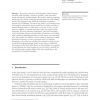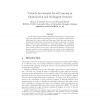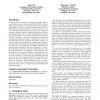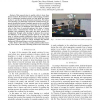116
click to vote
ALIFE
2010
15 years 1 months ago
2010
We present a model of social learning of both language and skills, while assuming—insofar as possible—strict autonomy, virtual embodiment, and situatedness. This model is built...
140
click to vote
GECCO
2008
Springer
15 years 3 months ago
2008
Springer
Social learning is a mechanism that allows individuals to acquire knowledge from others without incurring the costs of acquiring it individually. Individuals that learn socially c...
125
click to vote
IJCAI
2007
15 years 3 months ago
2007
Behavioral norms are key ingredients that allow agent coordination where societal laws do not sufficiently constrain agent behaviors. Whereas social laws need to be enforced in a...
133
click to vote
ATAL
2008
Springer
15 years 4 months ago
2008
Springer
In this paper, we investigate multi-agent learning (MAL) in a multi-agent resource selection problem (MARS) in which a large group of agents are competing for common resources. Si...
115
click to vote
EVOW
2003
Springer
15 years 7 months ago
2003
Springer
The most recent advances of artificial life research are opening up a new frontier: the creation of simulated life environments populated by autonomous agents. In several cases a n...
126
click to vote
HRI
2010
ACM
15 years 7 months ago
2010
ACM
—This research aims to enable robots to learn from human teachers. Motivated by human social learning, we believe that a transparent learning process can help guide the human tea...
111
click to vote
CHI
2009
ACM
16 years 2 months ago
2009
ACM
Social networking sites (SNS) are only as good as the content their users share. Therefore, designers of SNS seek to improve the overall user experience by encouraging members to ...




